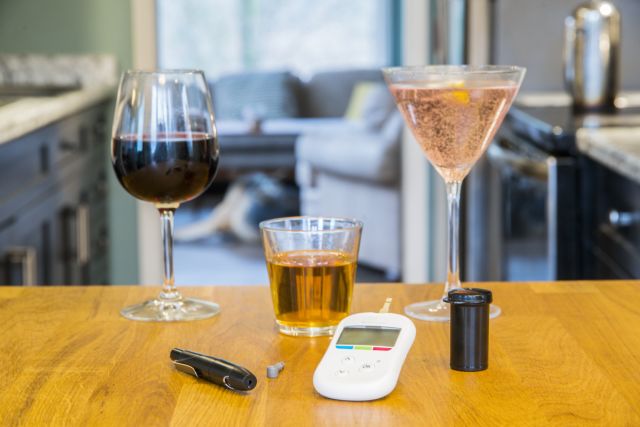Updated on March 26, 2024.
People with diabetes may not need to stop drinking entirely. But if you have the condition, even moderate or light drinking can be risky. Drinking could trigger or worsen some serious diabetes-related complications.
If you have diabetes and you plan on drinking alcohol, it’s important to understand how it can affect your condition and know what you can do to protect your health.
Can alcohol improve your health?
You should not drink for health benefits. Some research has suggested that moderate drinking (up to two drinks per day for men or one daily drink for women) may provide some possible health benefits, such as a lower risk for heart attack and stroke. But there is not clear proof, only a possible link. And it may be that these possible benefits are not actually from alcohol. It could be that people who drink no more than lightly or moderately tend to have other healthier habits that reduce their risk for a range of health issues. More research is needed to help answer this question.
The evidence suggesting that moderate drinking offers health benefits isn’t definitive. But it is clear that alcohol does increase the risk for some serious health issues, including certain types of cancer. And the more you drink, the greater the risks. So, if you do not drink, it's best not to start. If you do drink, it's important to limit your intake and be aware of how alcohol can affect your blood sugar and treatment for diabetes.
Your blood sugar could drop too low
Drinking alcohol can cause your blood sugar levels to drop.
“Many people think that alcohol will raise blood glucose or that it has a lot of sugar in it,” says Cara Schrager, MPH, RD, CDE, a registered dietitian and certified diabetes educator at Joslin Diabetes Center in Boston. “But the average glass of wine has only 4 grams of carbs, and spirits on their own contain no carbohydrates at all.” (Beer does contain carbohydrates—usually about 13 grams in a regular draft, but less in some lighter brews—and mixed drinks may contain a lot more if they’re made with sugary syrups or sodas.)
As soon as you start drinking, your body begins working to get rid of the alcohol and your blood sugar may drop. In fact, alcohol can cause your blood sugar level to remain low for up to 24 hours.
“Alcohol is metabolized in the liver, shutting down the liver’s ability to provide you with glucose [sugar] when you need it,” Schrager explains. The liver contains “emergency stores” of glucose to raise your blood sugar if it drops too low. But once those stores of glucose are used up, you can’t immediately replace them if you’ve had a lot to drink. This leads to low blood sugar levels, according to the American Diabetes Association (ADA).
If your stomach is empty or if you’re on insulin or another diabetes medication that can lower your blood sugar, you may be at even greater risk for very low blood sugar while drinking.
Low blood sugar, or hypoglycemia, can cause symptoms that include:
- Sleepiness
- Dizziness
- Nausea or vomiting
- Headache
- Shakiness
- Sweating
- Irritability
- Disorientation
If you've been drinking, these symptoms of very low blood sugar may be mistaken for drunkenness.
Hypoglycemia must be treated right away, but if people around you think you’re drunk or tipsy, you may not get the help you need. If you’ve been drinking, it might even be difficult for you to realize that your blood sugar is too low.
Diabetes may be harder to manage
For preventing alcohol-related health risks, adults who choose to drink should limit their consumption. Men should have no more than two drinks per day. Women should have no more than one drink per day. It's important to be aware of how much alcohol is in one drink. One serving of alcohol is defined as:
- 12 ounces of regular beer, which is commonly about 5 percent alcohol
- 5 ounces of wine, which is often around 12 percent alcohol
- 1.5 ounces of distilled spirits (gin, vodka, whiskey, etc.), which is roughly 40 percent alcohol
The same guidelines apply when it comes to drinking alcohol with diabetes, according to the ADA. But it’s important to remember that some types of beer, wine or liquor have more alcohol than others. In some cases, you may be consuming more than you realize. Drinking more than the recommended daily limits of alcohol could affect your ability to control your condition.
Your judgment could also be impaired by alcohol, Schrager cautions. Even if you’ve only had one drink your ability to make clear decisions and follow your treatment plan can be affected. “You could miss taking medications for your diabetes, such as long or rapid-acting insulin, leading to hyperglycemia (high blood glucose),” she says.
You could gain extra pounds
With diabetes, there’s a lot of focus on carbs. But it is important to consider how many calories are in alcoholic drinks, like a glass of wine or a beer. Over time, drinking regularly can lead to weight gain.
“Because alcohol contains 7 calories per gram, greater consumption may lead to weight gain,” says Schrager, echoing the results of a study published in January 2019 in the journal Obesity. Researchers followed almost 5,000 overweight people with type 2 diabetes for four years and found that people who did not drink alcohol in the group lost significantly more weight than those who drank heavily.
Drinking could increase your triglyceride levels (a type of fat in the blood). High triglycerides can make you more likely to have a heart attack and stroke. And people with diabetes are already at higher risk for heart disease, heart attack, and stroke.
Tips for staying safe with alcohol
Some people should not consume any alcohol, including pregnant people, those with a personal or family history of alcoholism or those with a history of alcohol-related liver or pancreatic disease.
Talk to your healthcare provider (HCP) about what’s best for you, and whether drinking alcohol will affect your current diabetes treatment plan.
If you do drink, follow the recommendations for light or moderate drinking. It’s also important to be mindful about your portions and the alcohol content of your alcohol beverages.
Here are some other tips to consider:
Reduce calories when possible. Choose sugar-free drink mixers such as diet soda, club soda, diet tonic water or seltzer when making a mixed drink. Pick light over regular or craft beer, which can have double the alcohol and calories of light beer.
Don’t drink alone. Let those who enjoy drinking with you know you have diabetes and explain what they should do if you develop low blood sugar. Wearing a diabetes ID bracelet will also help ensure you get the medical attention you need if your blood sugar level drops too low.
Don’t forget to eat. Avoid drinking alcohol on an empty stomach or when your blood sugar is low. It’s particularly important to have some food with your drink if you’re on insulin or taking diabetes pills that lower blood sugar levels.
Don’t replace food with alcohol. If you are counting carbohydrates, it’s never a good idea to replace food from your meal plan with an alcoholic drink.
Monitor your blood sugar. Check your blood sugar before you drink, and keep checking it while you are drinking and afterwards. “People with diabetes should check their blood sugar more frequently when drinking alcohol,” says Schrager. How often? The ADA recommends doing so before you drink, while you drink, before you go to bed and during the night.
Stay hydrated. Every time you have an alcoholic drink you should have a non-alcoholic drink along with it. Water, or another zero-calorie beverage is best. This can help you stay hydrated.







